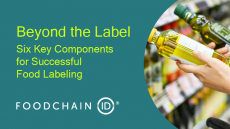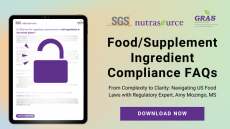Food industry hauled up over 'fresh' labels
time by the UK's food watchdog that accused it of misleading the
consumer when using the terms 'fresh?and 'natural?on food labels.
According to a recent survey of 220 foods by the Food Standards Agency (FSA), 40 per cent of samples examined were misleading or ambiguous, despite the majority of manufactures following best practice guidance issued by the agency.
"UK food and drink manufacturers rely on the loyalty and trust of their customers and in no way set out to mislead. Indeed, the 1990 Food Safety Act, protects consumers from misleading or false claims," responded Martin Paterson, deputy director general of the Food and Drink Federation, coming to the defence of the industry.
In July 2002, the agency issued advice on the use of eight marketing terms currently used on food labels in the UK: fresh; pure; natural; traditional; original; authentic; home made and farmhouse.
"They [the consumer] rightly expect foods labelled with these terms to be different in some way from products that don't carry these types of descriptions. For instance, they don't expect items labelled fresh to have a four-week shelf life, they don't expect items labelled as pure to have added ingredients and they don't expect products with ingredients described as natural to have used artificial preservatives and additives," said Rosemary Hignett, head of Food Labelling and Standards at the FSA.
While the FSA survey shows that many manufacturers are taking account of this and are giving consumers clear descriptions, others obviously have a long way to go, she added.
Pushing the food industry position, Paterson added: "In a highly competitive market, manufacturers try and differentiate their products, many of which are based on traditional recipes and production methods."
But there were two areas in particular where apparent misuse descriptive terms was most widespread - in the words 'farmhouse?and 'traditional?
The guidance for the term farmhouse states that this should only be used where the product has been made in a house on a farm, or more specifically in the main dwelling of the farmer himself. According to the FSA, 24 food samples examined used this term but in fact, for 18 of them ?a massive 75 per cent - there was clear evidence, or indications, that they were actually produced in industrial premises.
Again, the term 'traditional?was widely used on the labels of the foods sampled ?a total of 75 were examined in this category. Over one third (33 samples) did not follow the guidance, said the FSA, with thirty one products that called themselves 'traditional?actually using modern ingredients such as artificial additives, preservatives or sweeteners, 'which the public analysts did not consider would have been part of the original recipe,?said the FSA.
In a conciliatory phrase, Paterson added: "FDF has advised its members of the FSA guidance and is always looking at improving the information it provides to consumers on and off pack."















